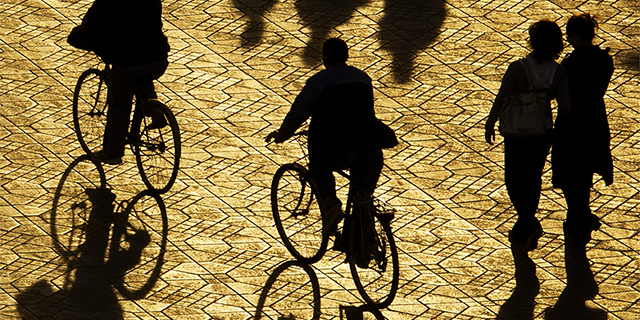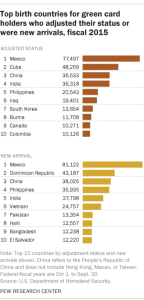
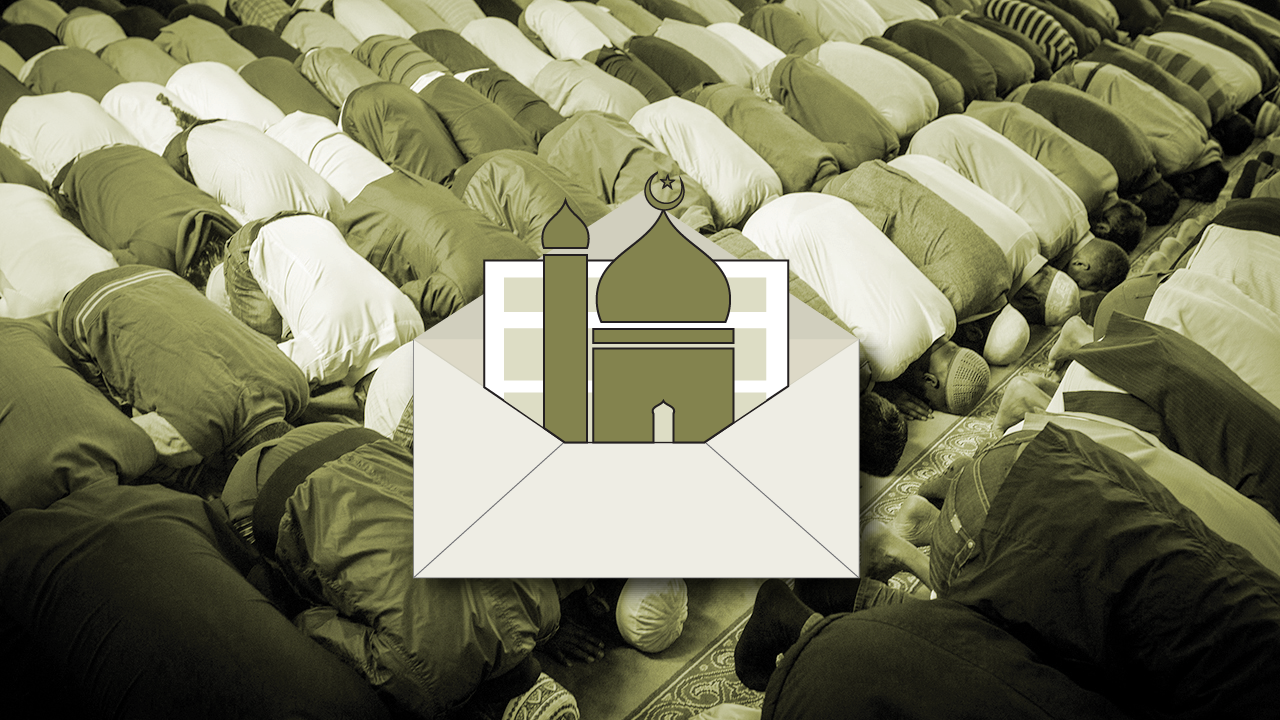
Try our email course on Muslims and Islam
Learn about Muslims and Islam through four short lessons delivered to your inbox every other day. Sign up now!
Muslims are the fastest-growing religious group in the world. The growth and regional migration of Muslims, combined with the ongoing impact of the Islamic State (also known as ISIS or ISIL) and other extremist groups that commit acts of violence in the name of Islam, have brought Muslims and the Islamic faith to the forefront of the political debate in many countries. Yet many facts about Muslims are not well known in some of these places, and most Americans – who live in a country with a relatively small Muslim population – have said they know little or nothing about Islam.
Here are answers to some key questions about Muslims, compiled from several Pew Research Center reports published in recent years:
How many Muslims are there? Where do they live?
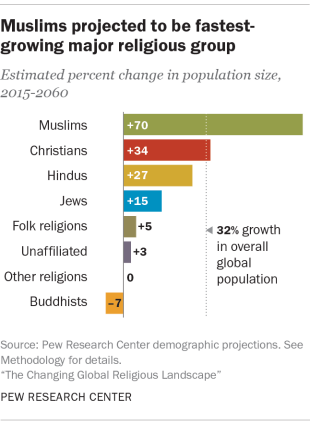
There were 1.8 billion Muslims in the world as of 2015 – roughly 24% of the global population – according to a Pew Research Center estimate. But while Islam is currently the world’s second-largest religion (after Christianity), it is the fastest-growing major religion. Indeed, if current demographic trends continue, the number of Muslims is expected to exceed the number of Christians by the end of this century.
Although many countries in the Middle East-North Africa region, where the religion originated in the seventh century, are heavily Muslim, the region is home to only about 20% of the world’s Muslims. A majority of the Muslims globally (62%) live in the Asia-Pacific region, including large populations in Indonesia, India, Pakistan, Bangladesh, Iran and Turkey.
Indonesia is currently the country with the world’s largest Muslim population, but Pew Research Center projects that India will have that distinction by the year 2050 (while remaining a majority-Hindu country), with more than 300 million Muslims.
The Muslim population in Europe also is growing; we project 10% of all Europeans will be Muslims by 2050.
How many Muslims are there in the United States?
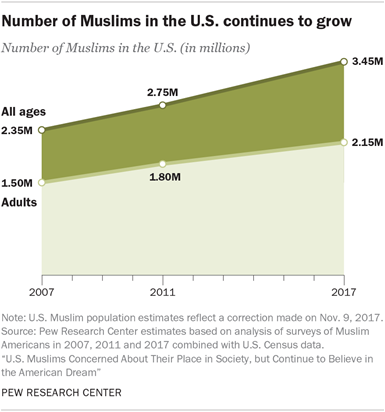
According to our estimate, there are about 3.45 million Muslims of all ages in the U.S., or about 1.1% of the U.S. population. This is based on an analysis of census statistics and data from a 2017 survey of U.S. Muslims, which was conducted in English as well as Arabic, Farsi and Urdu. Based on the same analysis, Pew Research Center also estimates that there are 2.15 million Muslim adults in the country, and that a majority of them (58%) are immigrants.
Our demographic projections estimate that Muslims will make up 2.1% of the U.S. population by the year 2050, surpassing people who identify as Jewish on the basis of religion as the second-largest faith group in the country (not including people who say they have no religion).
A 2013 Pew Research Center report estimated that the Muslim share of immigrants granted permanent residency status (green cards) increased from about 5% in 1992 to roughly 10% in 2012, representing about 100,000 immigrants in that year.
Why is the global Muslim population growing?
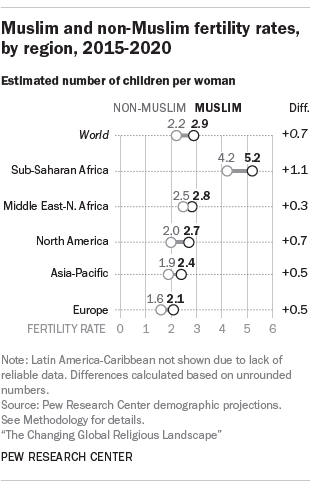
There are two major factors behind the rapid projected growth of Islam, and both involve simple demographics. For one, Muslims have more children than members of other religious groups. Around the world, each Muslim woman has an average of 2.9 children, compared with 2.2 for all other groups combined.
Muslims are also the youngest (median age of 24 years old in 2015) of all major religious groups, seven years younger than the median age of non-Muslims. As a result, a larger share of Muslims already are, or will soon be, at the point in their lives when they begin having children. This, combined with high fertility rates, will fuel Muslim population growth.
While it does not change the global population, migration is helping to increase the Muslim population in some regions, including North America and Europe.
How do Americans view Muslims and Islam?
A Pew Research Center survey conducted in 2017 asked Americans to rate members of nine religious groups on a “feeling thermometer” from 0 to 100, where 0 reflects the coldest, most negative possible rating and 100 the warmest, most positive rating. Overall, Americans gave Muslims an average rating of 48 degrees, similar to atheists (50).
Americans view more warmly the seven other religious groups mentioned in the survey (Jews, Catholics, mainline Protestants, evangelical Christians, Buddhists, Hindus and Mormons). But views toward Muslims (as well as several of the other groups) are now warmer than they were a few years ago; in 2014, U.S. adults gave Muslims an average rating of 40 degrees in a similar survey.
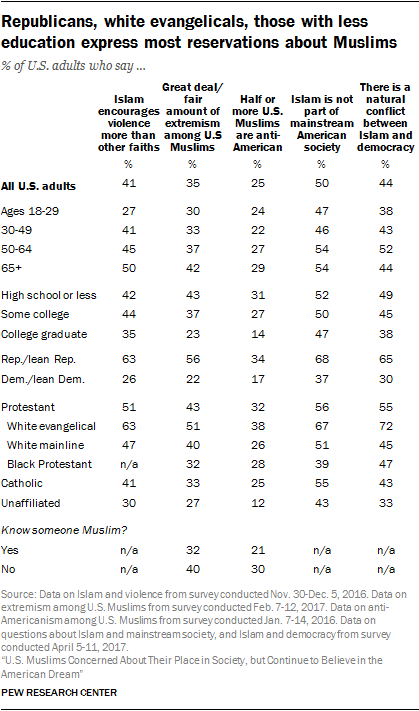
Republicans and those who lean toward the Republican Party gave Muslims an average rating of 39, considerably cooler than Democrats’ rating toward Muslims (56).
This partisan gap extends to several other questions about Muslims and Islam. Indeed, Republicans and Republican leaners also are more likely than Democrats and those who lean Democratic to say they are very concerned about extremism in the name of Islam, both around the world (67% vs. 40%) and in the U.S. (64% vs. 30%). In addition, a December 2016 survey found that more Republicans than Democrats say Islam is likelier than other religions to encourage violence among its believers (63% vs. 26% of Democrats). And while most Americans (69%) believe there is a lot of discrimination against Muslims in the U.S. today, views are again split by party: 85% of Democrats and those who lean Democratic and 49% of Republicans and GOP leaners hold this view.
Republicans also are more likely than Democrats to say that Islam is not part of mainstream American society (68% vs. 37%) and that there is a natural conflict between Islam and democracy (65% vs. 30%).
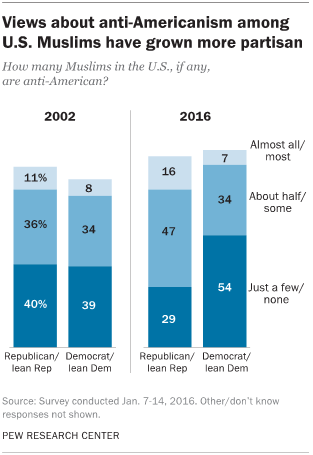
About half of Americans (49%) think at least “some” U.S. Muslims are anti-American, greater than the share who say “just a few” or “none” are anti-American, according to a January 2016 survey. Views on this question have become much more partisan in the last 14 years (see graphic). But most Americans do not see widespread support for extremism among Muslims living in the U.S., according to a February 2017 survey. Overall, 40% say there is not much support for extremism among U.S. Muslims, while an additional 15% say there is none at all. About a quarter say there is a fair amount of support (24%) for extremism among U.S. Muslims; 11% say there is a great deal of support.
How do Europeans view Muslims?
In spring 2016, we asked residents of 10 European counties for their impression of how many Muslims in their country support extremist groups, such as ISIS. In most cases, the prevailing view is that “just some” or “very few” Muslims support ISIS, but in Italy, 46% say “many” or “most” do.
The same survey asked Europeans whether they viewed Muslims favorably or unfavorably. Perceptions varied across European nations: Majorities in Hungary, Italy, Poland and Greece say they view Muslims unfavorably, while negative attitudes toward Muslims are much less common in France, Germany, the United Kingdom and elsewhere in Northern and Western Europe. People who place themselves on the right side of the ideological scale are much more likely than those on the left to see Muslims negatively.
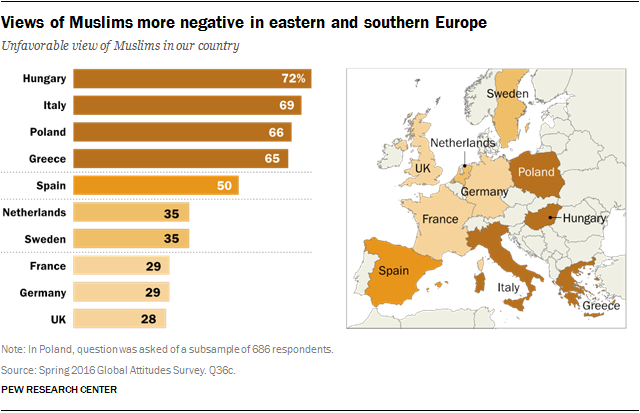
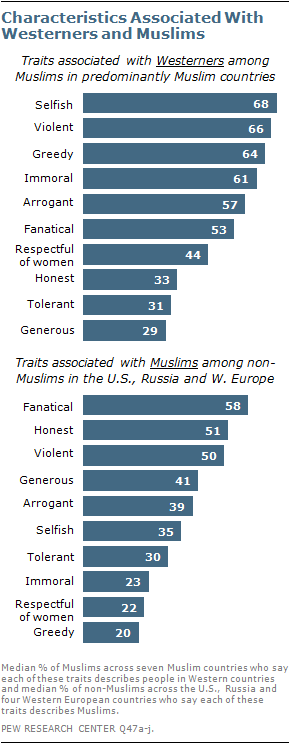
What characteristics do people in the Muslim world and people in the West associate with each other?
A 2011 survey asked about characteristics Westerners and Muslims may associate with one another. Across the seven Muslim-majority countries and territories surveyed, a median of 68% of Muslims said they view Westerners as selfish. Considerable shares also called Westerners other negative adjectives, including violent (median of 66%), greedy (64%) and immoral (61%), while fewer attributed positive characteristics like “respectful of women” (44%), honest (33%) and tolerant (31%) to Westerners.
Westerners’ views of Muslims were more mixed. A median of 50% across four Western European countries, the U.S. and Russia called Muslims violent and a median of 58% called them “fanatical,” but fewer used negative words like greedy, immoral or selfish. A median of just 22% of Westerners said Muslims are respectful of women, but far more said Muslims are honest (median of 51%) and generous (41%).
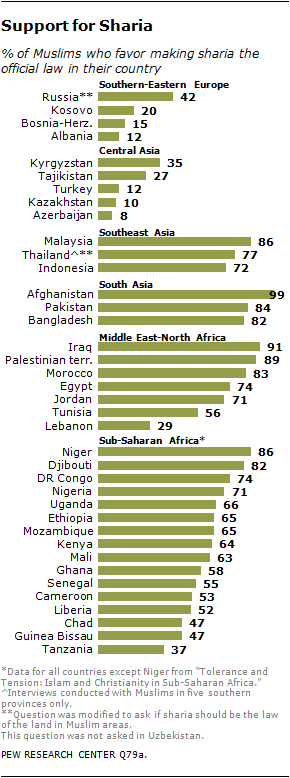
What do Muslims around the world believe?
Like any religious group, the religious beliefs and practices of Muslims vary depending on many factors, including where in the world they live. But Muslims around the world are almost universally united by a belief in one God and the Prophet Muhammad, and the practice of certain religious rituals, such as fasting during Ramadan, is widespread.
In other areas, however, there is less unity. For instance, a Pew Research Center survey of Muslims in 39 countries asked Muslims whether they want sharia law, a legal code based on the Quran and other Islamic scripture, to be the official law of the land in their country. Responses on this question vary widely. Nearly all Muslims in Afghanistan (99%) and most in Iraq (91%) and Pakistan (84%) support sharia law as official law. But in some other countries, especially in Eastern Europe and Central Asia – including Turkey (12%), Kazakhstan (10%) and Azerbaijan (8%) – relatively few favor the implementation of sharia law.
How do Muslims feel about groups like ISIS?
Recent surveys show that most people in several countries with significant Muslim populations have an unfavorable view of ISIS, including virtually all respondents in Lebanon and 94% in Jordan. Relatively small shares say they see ISIS favorably. In some countries, considerable portions of the population do not offer an opinion about ISIS, including a majority (62%) of Pakistanis.
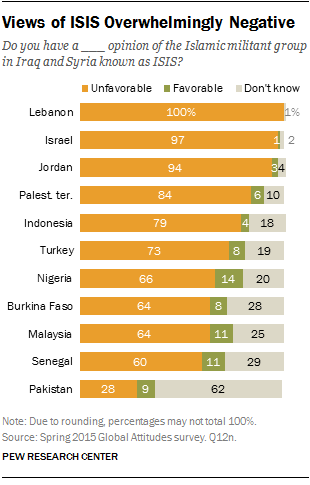
Favorable views of ISIS are somewhat higher in Nigeria (14%) than most other nations. Among Nigerian Muslims, 20% say they see ISIS favorably (compared with 7% of Nigerian Christians). The Nigerian militant group Boko Haram, which has been conducting a terrorist campaign in the country for years, has sworn allegiance to ISIS.
More generally, Muslims mostly say that suicide bombings and other forms of violence against civilians in the name of Islam are rarely or never justified, including 92% in Indonesia and 91% in Iraq. In the United States, a 2011 survey found that 86% of Muslims say such tactics are rarely or never justified. An additional 7% say suicide bombings are sometimes justified and 1% say they are often justified.
In a few countries, a quarter or more of Muslims say these acts of violence are at least sometimes justified, including 40% in the Palestinian territories, 39% in Afghanistan, 29% in Egypt and 26% in Bangladesh.
In many cases, people in countries with large Muslim populations are as concerned as Western nations about the threat of Islamic extremism, and have become increasingly concerned in recent years. About two-thirds of people in Nigeria (68%) and Lebanon (67%) said in 2016 that they are very concerned about Islamic extremism in their country, both up significantly since 2013.
What do American Muslims believe?
Our 2017 survey of U.S. Muslims finds that Muslims in the United States perceive a lot of discrimination against their religious group. Moreover, a solid majority of U.S. Muslims are leery of President Donald Trump and think their fellow Americans do not see Islam as part of mainstream U.S. society. At the same time, however, Muslim Americans overwhelmingly say they are proud to be Americans, believe that hard work generally brings success in this country and are satisfied with the way things are going in their own lives.

Half of Muslim Americans say it has become harder to be Muslim in the U.S. in recent years. And 48% say they have experienced at least one incident of discrimination in the past 12 months. But alongside these reports of discrimination, a similar – and growing – share (49%) of Muslim Americans say someone has expressed support for them because of their religion in the past year. And 55% think Americans in general are friendly toward U.S. Muslims, compared with just 14% who say they are unfriendly.
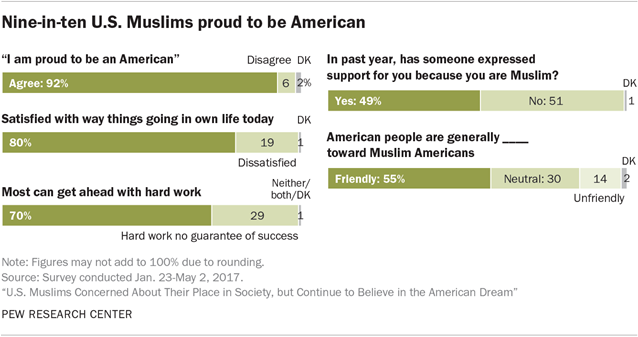
Living in a religiously pluralistic society, Muslim Americans are more likely than Muslims in many other largely Muslim-majority nations to have a lot of non-Muslim friends. Only about a third (36%) of U.S. Muslims say all or most of their close friends are also Muslims, compared with a global median of 95% in the 39 countries we surveyed.
Roughly two-thirds of U.S. Muslims (65%) say religion is very important in their lives. About six-in-ten (59%) report praying at least daily and 43% say they attend religious services at least weekly. By some of these traditional measures, Muslims in the U.S. are roughly as religious as U.S. Christians, although they are less religious than Muslims in many other nations.
When it comes to political and social views, Muslims are far more likely to identify with or lean toward the Democratic Party (66%) than the Republican Party (13%) and to say they prefer a bigger government providing more services (67%) over a smaller government providing fewer services (25%). And about half of U.S. Muslims (52%) now say homosexuality should be accepted by society, up considerably from 2011 (39%) and 2007 (27%).
What is the difference between Shiite Muslims and Sunni Muslims?
Sunnis and Shiites are two subgroups of Muslims, just as Catholics and Protestants are two subgroups within Christianity. The Sunni-Shiite divide is nearly 1,400 years old, dating back to a dispute over the succession of leadership in the Muslim community following the death of the Prophet Muhammad in 632. While the two groups agree on some core tenets of Islam, there are differences in beliefs and practices, and in some cases Sunnis do not consider Shiites to be Muslims.
With the exception of a few countries, including Iran (which is majority Shiite) as well as Iraq and Lebanon (which are split), most nations with a large number of Muslims have more Sunnis than Shiites. In the U.S., 55% identify as Sunnis and 16% as Shiites (with the rest identifying with neither group, including some who say they are just a Muslim).
Note: This post was updated on Aug. 9, 2017. It was originally published Dec. 7, 2015.
Correction: U.S. Muslim population estimates in this post, including the chart “Number of Muslims in the U.S. continues to grow,” were corrected on Nov. 14, 2017. For details, see Appendix B: Survey Methodology, note 37, of the report “U.S. Muslims Concerned About Their Place in Society, but Continue to Believe in the American Dream.”
Related posts:
In many ways, Muslim men and women see life in America differently
U.S. Muslims are religiously observant, but open to multiple interpretations of Islam
